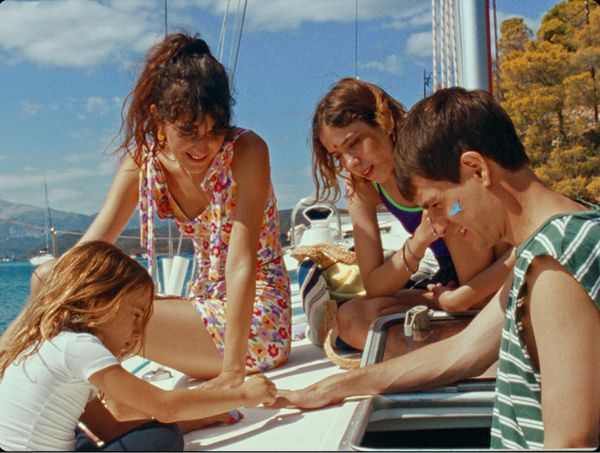Eye For Film >> Movies >> Kyuka Before Summer's End (2024) Film Review
Kyuka Before Summer's End
Reviewed by: Sergiu Inizian

Against the soothing backdrop of a Greek summer, Kostis Charamountanis ambitiously crafts a light-hearted story exploring the past of a family which keeps the mirage of reconciliation alive. As quirky as its title, which means vacation in Japanese, this feature debut unfolds restlessly, driven by a hectic montage of nostalgic home videos, slapstick sketches and curious meditative scenes. Between fragments of formal experimentation, the relationship between the two siblings and their father's struggle with melancholia deliver a muddled but tender summer chronicle.
In the scorching sun, Konstantinos (Konstantinos Georgopoulos) and Elsa (Elsa Lekakou) wait for the father on the dock. They act silly and are constantly teasing each other, anticipating what will be an enjoyable sailboat vacation. The arrival of their father, Babis (Simeon Tsakiris), brings some tension as he can't seem to find the boat's keys. We soon find out his mind is preoccupied with his secret plan to reunite the teenagers with Anna (Elena Topalidou), their estranged mother.

The narrative builds slowly, Charamountanis capturing summer's mellow rhythm. Contrasting their father's desire to teach them fishing and sailing, Elsa and her brother prefer basking in the sunlight and enjoying their vacation. Their lounging is accompanied by a tender instrumental score composed by the director, which briefly glides towards melancholic cadences, signalling a hidden longing for past summers, when their mother would have been present.
As they reach their destination, the filmmaker showcases his experimental style, allowing the narrative to unfold non-linearly and approaching acting through a free-form, even burlesque lens. Anna's first encounter with Babis highlights an inclination to make light of serious matters, which becomes a recurring preference in a debut that operates solely by its own oddity. Still, Kyuka presents a lot of heart, especially when jumbled fragments of joy, packaged in comforting home videos, find themselves intertwined with the present. Anna experiences such a moment in her hotel, watching footage of the two siblings and absorbing the moments she lost to a past she wasn't a part of.
Konstantinos and Elsa's relationship is the key emotional pillar onto which the often-cluttered narrative stands. Without knowing the real reason behind the trip, they can enjoy the summer and each other's company. Their random meeting with Ioli (Ioli Kalaitzi), a little girl and Artemis (Afroditi Kapokaki), her older sister, allows them to explore their thoughts on family in their own way. Beyond just a simple chance encounter, this sequence offers a sense of connection and borrowed time, without bearing the burden of a secret plan to reconcile with the past.
Despite his best efforts to understand his children and find a solution for his divided family, Babis always finds himself marginalised from the others. He is a serious character who brings a lot of weight to a narrative that needs his paternal stubbornness. Yet, his appeal gets lost in a bizarre sequence of fishing-related moments, highlighting the director's propensity for defusing his more earnest scenes with deliberate quirk. Nevertheless, Babis is essential in a narrative that explores how past mistakes float around us against our desires. For him, the second part of the title is a call to action, which puts pressure on a father who wants to see his family reunited.
Charamountanis' approach to filmmaking feels like an amalgamation of styles and sensibilities or a short film collection. His constant appetite for experimentation diminishes the heart of a film that deals with the delicate ins and outs of a separated household. But he manages to evoke a sense of yearning for simpler times, capturing the emotional state of a family that ails from the constant question of what could have been.
Reviewed on: 23 May 2024















